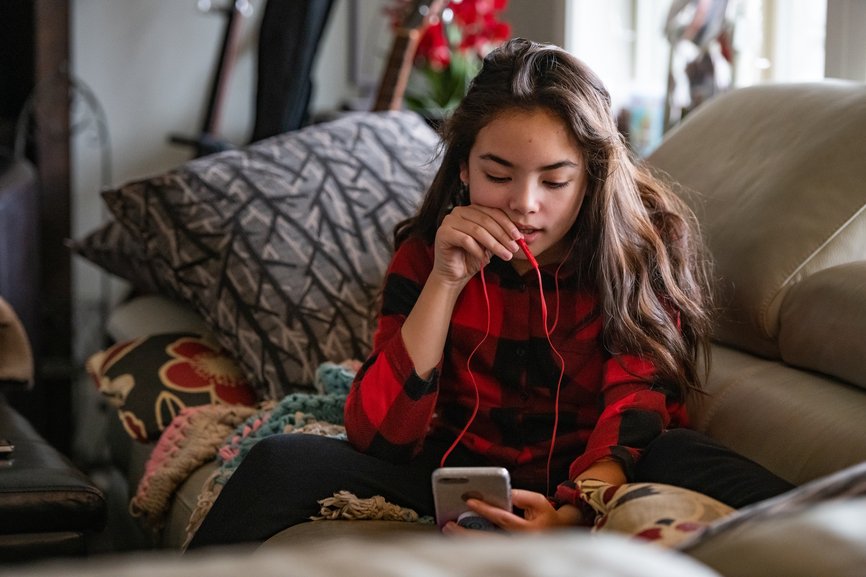
Right now, social media use is through the roof, especially for young people. According to a September report from the Children’s Hospital of Chicago, 63 percent of parents surveyed said their teens are using social media more than they did before the pandemic. Most respondents expressed concern about this, and reported that social media is having a negative effect on their children.
While it might be tempting to take devices away or unplug the WiFi router, there are actually benefits to social media use for teens — as long as it’s used in a balanced and productive way. Here are four key steps that can help ensure this happens.
1. Understand the unique environment we’re in, especially in the context of your teen’s development.
In adolescence, teenagers begin to define their identity and self-worth in the context of their peer relationships. As teens establish a sense of self and learn to navigate the world, they constantly look to their peers to determine if they are headed in the right direction. It is normal for teens to seek a sense of belonging and validation from others, which is why regular interaction with friends and acquaintances is such a vital part of teenage life.
Normally, all of this happens at school or while hanging out with friends in their free time. But since COVID-19 has rendered these options inaccessible, teens have to go where their friends are–and that’s social media.
This isn’t necessarily a bad thing. Online communication helps teens express themselves and maintain the connections that are an integral part of their path to adulthood. Understanding and accepting these motivations is the first step toward getting a handle on helping your teens interact with social media in a healthy way.
2. It is possible, and advisable, to set realistic social media boundaries.
Sometimes, it might feel like you face an all-or-nothing choice. Either your teen is banned from using devices, or you’re looking at the back of a smartphone instead of their face every day. But there is a middle ground where you can both get what you want.
There’s a big difference between sending a few messages to a friend and scrolling through Instagram for hours on end. The first step is to explain to your teen why you’d like them to limit their social media usage rather than simply creating a rule. This not only establishes clarity about acceptable behavior in your family, but also the why underpinning those boundaries. For example, “In our family, it’s really important to spend time together without screens during dinner, so we can talk to each other.” Remember that it is not necessary to convince your teen you are right every time you make a rule. Describe the boundary or rule, express why it is important, and know that this is the first of many conversations you will likely have about this issue.
When implementing boundaries, it also helps to model the behavior yourself. If you ban screens during dinner, but then check your work email or scroll social media, it may be increasingly difficult to enforce that rule down the line. Make your life easier by emphasizing how everyone in the family is working on improving this behavior, and even though none of you are perfect, you are all trying your best together.
3. Focus on the quality of social media time, not just quantity.
Preparing your teen to interact effectively with social media isn’t just about setting screen time limits. It also means teaching them how to think critically about the social media content they consume, and how to accurately interpret what they see and hear.
Having a supportive, direct conversation with your teen about this can pay huge dividends down the road. Try initiating this conversation by getting their reactions to what they see online. Offer some perspective by discussing how not everything on social media is what it seems. Draw from your personal experiences–especially if you’ve found your own social media usage challenging during the pandemic.
An especially effective strategy is what’s called externalizing language. In this case, it means referring to social media itself or the house rules as the concern, rather than your teen’s behavior. For example, you might say, “I notice following screen time rules has been really hard lately,” instead of “You never follow the rules.” This is a great way to get your foot in the door and open up a conversation in which your teen is willing to participate.
4. Look for social media alternatives that still allow for socializing.
Since we know adolescents will reach out to their peers no matter what, help your teen get their needs for social interaction met by proactively encouraging them to schedule face time with friends or to plan a socially distanced activity outside. The more you help your teen plan specific social interactions to look forward to, the less they’ll need to rely on mindlessly scrolling through social media to satisfy that need.
As the pandemic continues, nobody knows what lies ahead in terms of school schedules, restrictions, and health guidelines. But here’s what we do know: Teens will still need to socialize, because it’s such a crucial part of their development. Reframing how social media is used, putting boundaries in place that feel respectful instead of restrictive, and getting back to in-person socializing when it’s safe to do so will help you, your teen, and your family weather the storm. Having a plan and clarifying expectations will help to reduce anxiety, while working together to manage this complex issue will build resilience, and strengthen your family connection over time.
CONTACT US
If you want help connecting with a therapist, Lyra can assist you. You can get started today if Lyra is offered by your employer. Sign up here.
For employers who want to learn more about how Lyra’s enhanced EAP addresses network adequacy and quality issues, download our whitepaper on quality or get in touch.
And check in frequently here or follow us on Facebook, LinkedIn, and Twitter for more insights into supporting employees’ mental health.
DISCLAIMER
The content of this blog is not intended to be a substitute for professional medical advice, diagnosis, or treatment.
ABOUT THE AUTHOR
Katie McKenna is a Clinical Lead at Lyra Health and a Licensed Clinical Social Worker who specializes in depression and crisis management in adolescent and adult populations. She has 15 years of experience providing community-based mental health and crisis services to underserved populations. Prior to joining Lyra, Katie was a therapist with a clinic providing evidence-based treatment to suicidal teenagers involved in the San Francisco foster care system. Katie also provided in-person mental health services for San Francisco based non-profits. In her current role at Lyra Health, Katie consults with employers and managers on crisis management strategy for employees in distress, and offers clinical support to the clinicians in the Lyra Health network.
Prioritize your emotional well‑being.
Join Lyra today

